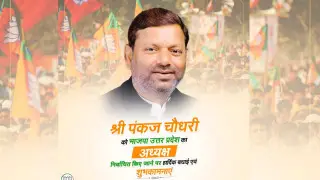
Rahul Gandhi has even been criticized for suggesting that Congress might abolish reservations. (X/TariqKarra)
New Delhi: Since India’s independence, the Congress party has publicly celebrated the Constitution and honored its chief architect, Dr. Babasaheb Ambedkar. Yet, critics argue that Congress’s actions have often contradicted these values. For instance, Congress enforced a separate constitution for Kashmir for many years, leading some to question the party's commitment to Ambedkar’s ideals. Additionally, critics claim that Congress has leaned on Ambedkar’s legacy primarily as an electoral strategy rather than fully implementing his vision, especially regarding reservations for marginalized communities.
Over the years, Congress leaders, from Jawaharlal Nehru to Rahul Gandhi, have faced criticism for their stance on reservations for SC, ST, and OBC communities, provisions originally designed by Ambedkar to uplift disadvantaged communities. Rahul Gandhi has even been criticized for suggesting that Congress might abolish reservations. This assertion, echoed by Congress’s Maharashtra State President Nana Patole, has drawn condemnation from various marginalized groups, particularly Dalits, who feel betrayed by Congress’s perceived pivot away from Ambedkar’s social reforms.
The BJP has seized on Congress’s controversial stance, questioning their authority to dismantle reservations and pointing to Prime Minister Narendra Modi’s administration as one that upholds and expands these provisions for marginalized communities. By doing so, BJP has positioned itself as a defender of Ambedkar’s principles, underscoring its commitment to uplift the underprivileged.
Congress’s recent comments have sparked outrage among Dalit, SC, ST, and OBC communities. Critics accuse Congress of focusing on other electoral demographics while sidelining Dalit interests. Many in these communities feel that Congress has undermined Ambedkar’s vision, prioritizing economic interests over social justice, a position that may influence voting dynamics in the upcoming elections.
Since India’s independence, the Congress party has publicly celebrated the Constitution and honored its chief architect, Dr. Babasaheb Ambedkar. Yet, critics argue that Congress’s actions have often contradicted these values. For instance, Congress enforced a separate constitution for Kashmir for many years, leading some to question the party's commitment to Ambedkar’s ideals. Additionally, critics claim that Congress has leaned on Ambedkar’s legacy primarily as an electoral strategy rather than fully implementing his vision, especially regarding reservations for marginalized communities.
Over the years, Congress leaders, from Jawaharlal Nehru to Rahul Gandhi, have faced criticism for their stance on reservations for SC, ST, and OBC communities, provisions originally designed by Ambedkar to uplift disadvantaged communities. Rahul Gandhi has even been criticized for suggesting that Congress might abolish reservations. This assertion, echoed by Congress’s Maharashtra State President Nana Patole, has drawn condemnation from various marginalized groups, particularly Dalits, who feel betrayed by Congress’s perceived pivot away from Ambedkar’s social reforms.
The BJP has seized on Congress’s controversial stance, questioning their authority to dismantle reservations and pointing to Prime Minister Narendra Modi’s administration as one that upholds and expands these provisions for marginalized communities. By doing so, BJP has positioned itself as a defender of Ambedkar’s principles, underscoring its commitment to uplift the underprivileged.
Congress’s recent comments have sparked outrage among Dalit, SC, ST, and OBC communities. Critics accuse Congress of focusing on other electoral demographics while sidelining Dalit interests. Many in these communities feel that Congress has undermined Ambedkar’s vision, prioritizing economic interests over social justice, a position that may influence voting dynamics in the upcoming elections.













Copyright © 2025 Top Indian News
